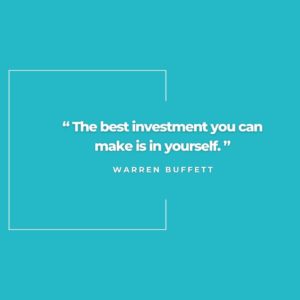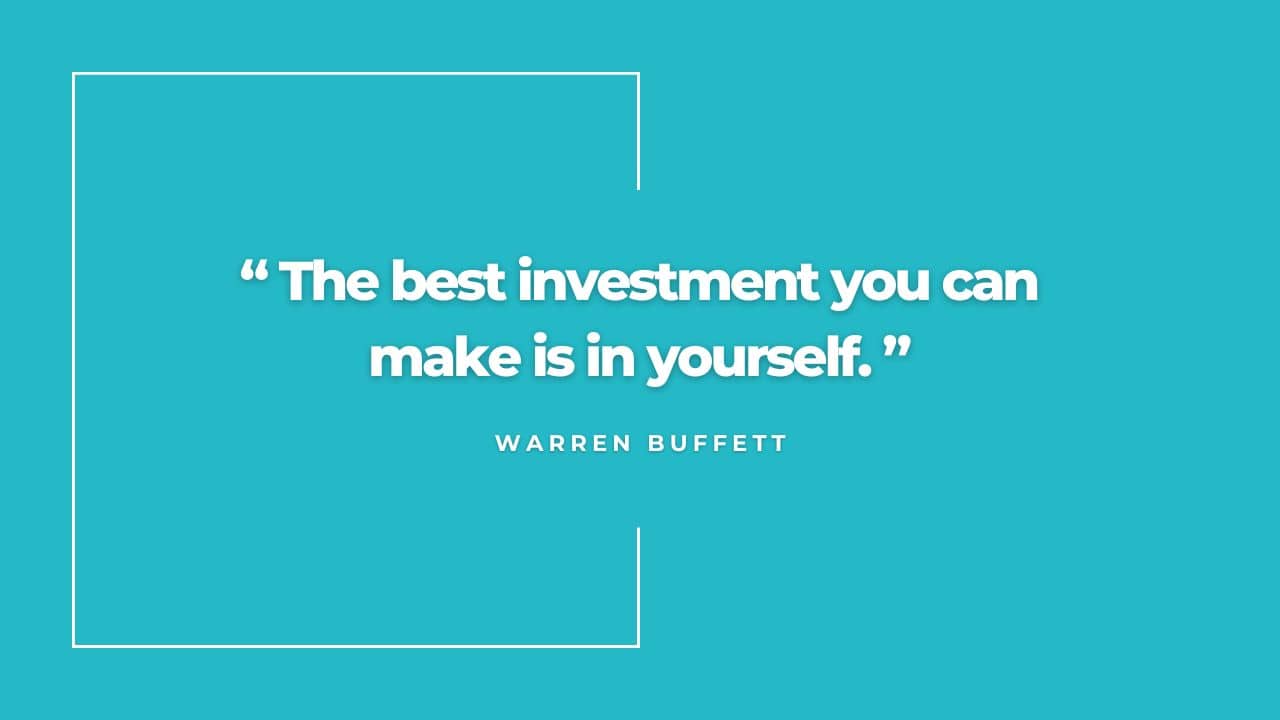In the vast world of investment, Warren Buffett stands as a titan whose advice is gold. His declaration, “The best investment you can make is in yourself,” rings more profoundly today than ever before. In an era characterised by rapid technological advancements and shifting job markets, investing in oneself isn’t just advisable; it’s essential.
Self-investment transcends mere financial commitments. It involves dedicating time and resources to personal development, acquiring new skills, and nurturing one’s physical and mental health. The scope of self-investment is boundless—from learning a new language to practicing mindfulness, each step taken is a brick added to the formidable edifice of one’s capabilities.
This article will explore the multifaceted nature of self-investment. We’ll delve into its various forms, the significant returns it can yield, and practical advice on how to embark on this rewarding journey. We’ll also address common obstacles and provide motivational insights from those who have reaped the benefits of investing in themselves. Ultimately, we aim to inspire you to take action and embrace the profound benefits that come from prioritising personal growth and wellbeing.
Understanding Self-Investment
Investing in oneself is an expansive concept that encompasses any action taken to improve one’s own abilities, potential, and overall well-being. It’s the conscious choice to allocate resources such as time, money, and effort towards personal growth and enrichment.
Forms of Self-Investment
Education: This can be formal education like degrees and certifications or informal learning such as books, webinars, and seminars. Education broadens one’s horizons, keeps the mind active, and opens up new opportunities for career advancement and personal satisfaction.
Health: Investing in health includes maintaining a balanced diet, regular physical activity, and seeking medical care when necessary. Mental health, an equally crucial facet, involves practices such as therapy, meditation, and stress management techniques. Good health is foundational, as it enhances one’s ability to pursue all other forms of self-investment.
Skills Development: This involves acquiring new skills or honing existing ones, whether they are directly linked to one’s career or personal interests, such as digital skills, leadership capabilities, or artistic talents. Skills development keeps an individual competitive and relevant in the professional field.
Mental Wellbeing: Activities that nurture the mind and emotional state, such as practicing mindfulness, engaging in hobbies, and building social connections, are vital. They not only enhance emotional resilience but also improve the quality of both personal and professional relationships.
Impact on Personal and Professional Life
The benefits of self-investment manifest in numerous impactful ways
Career: Enhanced skills and qualifications can lead to promotions, salary increases, and greater job security. An investment in education and skills makes one more adaptable and innovative, traits highly valued in the modern workplace.
Personal Satisfaction and Confidence: Learning and personal development generate a sense of achievement and fulfilment. This self-confidence spills over into various aspects of life, empowering individuals to set and achieve higher goals.
Resilience: By investing in health and mental well-being, individuals build resilience against stress and burnout, enabling them to tackle professional challenges more effectively and maintain productivity.
Relationships: Improved communication skills, empathy, and emotional intelligence, which come from self-investment, lead to stronger and more meaningful relationships with colleagues, friends, and family.
Self-investment is a dynamic and continuous process that not only propels individuals towards their personal and professional goals but also enhances their overall quality of life. This holistic approach to self-improvement lays a robust foundation for lasting success and happiness.
The Returns on Self-Investment
Investing in oneself not only fosters growth but also yields tangible and significant returns across various dimensions of life. Below are some examples illustrating how self-investment can lead to substantial benefits.
Career Advancements
Educational qualifications and enhanced skills are among the most direct paths to career progression. A survey by the National Center for Education Statistics found that adults with higher educational attainment levels generally earn significantly higher wages. For instance, individuals with a bachelor’s degree earn roughly 64% more than those with just a high school diploma. Moreover, acquiring specialised skills, particularly in high-demand areas like technology or leadership, often positions individuals for promotions, leadership roles, and entrepreneurial opportunities. For example, a LinkedIn report highlighted that people who engaged in learning courses related to project management and data analysis saw a 20% faster rate of career advancement than their peers.
Improved Personal Satisfaction and Mental Health
Investing in self-care, such as regular exercise, adequate sleep, and healthy eating, has a profound impact on personal satisfaction and mental health. According to a study published in the Lancet, individuals who engaged in regular physical activity reported 43% fewer days of poor mental health compared to those who did not exercise. Additionally, practices like mindfulness and meditation have been shown to decrease stress and anxiety levels, with a Harvard study revealing that mindfulness meditation can reduce anxiety symptoms by as much as 30%.
Enhanced Relationships and Social Connections
Effective communication and emotional intelligence, fostered through self-investment, enhance interpersonal relationships and networking abilities. A study from the American Journal of Public Health noted that individuals with strong social connections have a 50% increased likelihood of longevity. Furthermore, better social skills lead to more effective networking, which is crucial for career opportunities and personal growth.
Increased Resilience
Investing in one’s health and well-being increases resilience, allowing individuals to better manage stress and recover from setbacks more quickly. Research from the University of California found that individuals who engage in regular mental health practices like mindfulness exhibit significantly lower cortisol levels, indicative of reduced stress.
Broadened Perspectives and Creativity
Learning new skills and engaging in continuous education expose individuals to diverse ideas and cultures, fostering creativity. A report by Adobe states that companies which encourage creativity enjoy 1.5 times greater market share due to innovative products and solutions derived from a creative workforce.
Self-investment not only prepares individuals for external opportunities but also enhances their inner life, contributing to a more fulfilling and productive existence. These investments, while sometimes requiring significant time and resources, consistently pay off, making them some of the wisest decisions one can make.
Practical Ways to Invest in Yourself
Investing in yourself is one of the most beneficial decisions you can make. Here are some actionable ways you can start this journey, along with recommendations for helpful resources that might include affiliate products or services designed to aid your self-improvement efforts.
Online Courses and Workshops
Skill Development: Platforms like Coursera and Udemy offer a wide range of courses across various fields such as digital marketing, coding, graphic design, and more. These skills are not only marketable but also enable you to adapt to changing industry trends.
Professional Certifications: Obtain certifications from recognised bodies in your field to enhance your credibility. LinkedIn Learning provides courses that often come with a certification upon completion, which can be added directly to your LinkedIn profile.
Creative Skills: Explore classes on platforms like Skillshare to unleash your creative potential in areas like writing, photography, or even cooking. These skills can transform hobbies into potential income streams or simply enrich your personal life.
Health and Wellness Programs
Fitness Subscriptions: Consider memberships at local gyms or subscribe to online platforms like Peloton or Fitness Blender that offer a range of workouts suitable for all fitness levels. Regular exercise is a key component of physical health investment.
Diet and Nutrition: Use services like MyFitnessPal or subscribe to healthy meal plans that can help you monitor your dietary habits and maintain a balanced diet, crucial for overall well-being.
Wellness Apps: Apps such as Headspace or Calm offer guided meditation sessions that can help reduce stress and enhance mental clarity.
Mindfulness and Mental Health Practices
Daily Meditation: Allocate a few minutes each day for meditation. You can find guided sessions on YouTube or through apps mentioned above, which are designed to suit various experience levels.
Journaling: Start a daily journaling habit to reflect on your day, jot down things you are grateful for, and set personal goals. This can enhance mental clarity and emotional health.
Counselling Services: Consider using online platforms like BetterHelp or Talkspace, which provide access to professional counselling in a flexible and accessible manner. Mental health is as crucial as physical health in your self-investment journey.
Affiliate Products or Services
Educational Tools: Promote e-readers like Kindle, which can encourage reading and lifelong learning. Link to your affiliate marketplace where readers can purchase these devices.
Fitness Equipment: Offer links to purchase recommended fitness equipment or gear from affiliate sports stores.
Health Supplements: If relevant, include links to trusted suppliers of vitamins and supplements that support overall health.
Overcoming Common Barriers
Investing in oneself is a rewarding journey, but it’s not without its obstacles. Common challenges such as lack of time, financial constraints, and low motivation can hinder progress. Here’s how to address these barriers effectively and keep moving forward in your personal growth journey.
Time Constraints
Many people struggle to find the time for self-improvement amidst busy schedules.
Prioritise and Plan: Start by evaluating your daily activities and prioritise tasks. Use tools like Google Calendar or Trello to schedule specific times for learning or health activities, treating them as non-negotiable appointments.
Small Increments: Remember, even 15 to 30 minutes a day can be effective. For instance, a short meditation session or a brief educational video during your lunch break can cumulatively lead to significant improvements.
Utilise Downtime: Listen to audiobooks or podcasts related to your interests during commutes or while exercising.
Financial Limitations
The cost of courses, health programs, and other resources can be a barrier.
Free Resources: Utilise free online platforms like Khan Academy for academic learning or apps that offer no-cost exercise routines. Public libraries also provide access to a range of educational materials and courses.
Budget for Growth: Allocate a small portion of your budget specifically for self-investment. Treat it as essential as your other regular expenses.
Seek Employer Support: Many employers offer professional development funds or reimbursements for health programs. Explore what your employer provides.
Lack of Motivation
Staying motivated can be challenging, especially when results aren’t immediately apparent.
Set Clear Goals: Define what you want to achieve with your self-investment efforts. Setting clear, achievable goals can provide direction and a sense of purpose.
Track Progress: Keep a log of your activities and progress. Seeing even small improvements can be a great motivational booster.
Join Communities: Engage with like-minded individuals either online or in person. Communities can offer support, advice, and motivation to keep progressing.
Motivational Anecdotes and Quotes
Anecdote: Consider the story of a working parent who managed to earn an online degree by studying during lunch breaks and late evenings, eventually landing a dream job. This tale exemplifies how investing in oneself, despite time constraints, can lead to life-changing rewards.
Quote: “It is never too late to be what you might have been.” – George Eliot. This quote serves as a powerful reminder that no matter where you are in life, the potential for growth and change is always within reach.
Conclusion
Warren Buffett’s sage advice, “The best investment you can make is in yourself,” has never been more pertinent. In an ever-evolving world, the continuous personal investment not only enhances your current capabilities but also secures your future relevance and success. By investing in your education, health, skills, and mental wellbeing, you are essentially laying down the foundations for a more prosperous and fulfilling life.
Now is the perfect time to take that first step towards personal investment. Whether it’s signing up for an online course to enhance your professional skills, joining a fitness program to improve your physical health, or simply dedicating time each day to read and expand your knowledge, every small step is a leap towards a better you.
Invest in yourself today; your future self will thank you for it.







